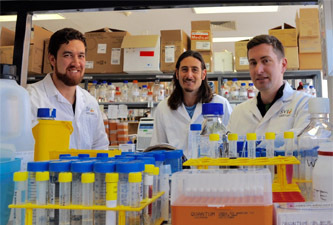A security guard for cells

St Vincent’s Institute of Medical Research (SVI), in collaboration with researchers in the USA and Germany, has discovered a warning system in cells that senses foreign RNA and activates an immune response in order to combat incoming infections.
A certain protein in the cell, called ADAR1, adds a distinct chemical signal to the cell’s own RNA — a ‘me’ signal — so that the cell can recognise the difference between its own RNA (self) and foreign RNA (non-self). As explained by lead researcher Dr Carl Walkley, “ADAR1 works like a security guard; the guard issues security passes for people who work in the building and authorises their presence.
“When unauthorised people in the building are recognised by the alarm system, which would otherwise not be able to tell the difference, it sets off an alarm.”
Until the recent study, which was published in the journal Science, researchers were not sure of the specific role of ADAR1. The SVI team tested their theory by disabling a key function of ADAR1 in mice.
“When we did so, we found that the cell reacted as if it was infected by a virus — even when there was no infection present,” Dr Walkley said. “We believe this is because the cell’s alarm system, in this case a protein called MDA5, was ‘seeing’ some of its own RNA as foreign.
“Imagine the security guard couldn’t see the passes, and so everyone in the building — even those who are allowed to be there — could be suspected of being unauthorised, causing the guard to set off the alarm unnecessarily or for the wrong reasons.”
The discovery means researchers will now be able to better understand how cells are able to tell the difference between their own RNA and foreign RNA, such as that from a virus. It should also improve our understanding of what happens in patients with mutations in ADAR1, such as sufferers of the rare autoimmune disorder Aicardi-Goutières syndrome.
ADHD may be linked with an increased risk of dementia
An adult brain affected by attention deficit hyperactivity disorder (ADHD) presents modifications...
Placebos appear to reduce PMS symptoms
Women affected by premenstrual syndrome (PMS) appear to experience less intense and debilitating...
Medicinal cannabis linked to long-term health benefits
As scientists find a way to improve the effectiveness of CBD, a separate study shows that...




